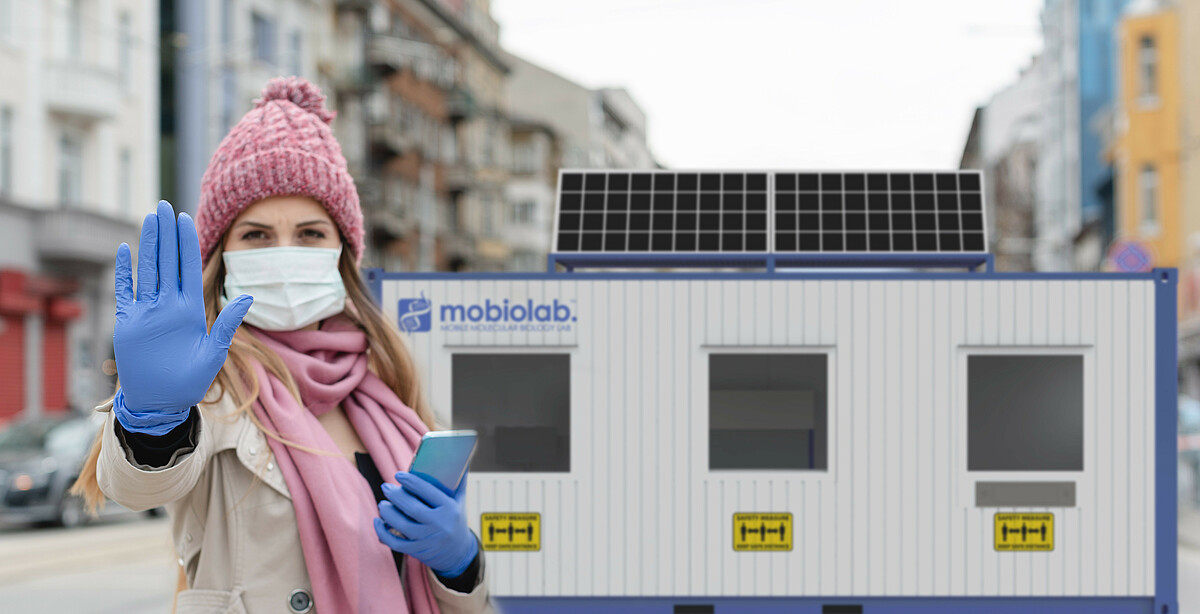Berlin in times of Corona
How the healthcare sector is facing the pandemic
In late January the Sars-Cov-2 pandemic officially arrived and started spreading across Germany. Since then - as in almost every other country globally - every new day has presented previously unknown challenges and uncertainties, both for public health as well as the healthcare industry.
During the pandemic, the capital region composed of the two federal states Berlin-Brandenburg has not only shown a high degree of solidarity with one another, but has in the fight against corona also lived up to its international reputation as a life science region. As soon as the public healthcare situation was manageable within the region, Berlin-Brandenburg supported EU partners Italy and France in the treatment of seriously affected corona patients. Since intensive care units in hospitals near their homes were in some places completely overloaded due to the pandemic, emergency patients from these countries in need of respiratory care were brought to several clinics in Berlin and Brandenburg to receive treatment.
Within only a few weeks, the Corona Treatment Centre was built at the Berlin exhibition centre as part of the Berlin SAVE Concept. It was designed to relieve Berlin’s hospitals so that they can focus on treating critical Covid-19 cases. Covid-19 patients in the 50 or so emergency clinics in Berlin not in need of intensive care may be transferred to the new treatment centre should the need arise in the further course of the pandemic. A total of approx. 800 beds are available to Covid-19 patients. Twenty percent of the beds are equipped with state-of-the-art ventilators, available in case the patient’s condition worsens.
As in other centers of medical innovation, in Berlin scientists have been working intensively on tests, vaccines and therapy options. Furthermore, numerous initiatives by and for companies have emerged to make urgently needed supplies and personnel available and distribute them efficiently. A few “hidden champions“ of the Berlin based biotech industry have come to light. Companies such as Biotechrabbit and TIB Molbiol were among the first who were able to ship a reliable testing solution globally to detect the novel virus in the human body, based on Polymerase-Chain-Reaction. As early as April 2020 Mobiolab introduced the first mobile lab-solution for biomolecular diagnosis of infectious diseases caused by SARS-CoV-2, based on 20ft shipping containers.

The Innovation Race
In the race not only to diagnose but also gain a better medical understanding of Covid-19 for suitable treatment, the internationally renowned research landscape of Berlin-Brandenburg combined forces and resources with new initiatives, with a particular focus on single-cell-analysis. Alongside those initiatives from the Charité, BIH, Max-Delbrück-Centrum, and the Hasso-Plattner-Institute, academic institutions like the Beuth University of Applied Sciences and the University of Potsdam are using technologies such as artificial intelligence and big data to develop new computing models and intelligent platforms in order to further improve the risk assessment of the virus.
Necessity is the mother of invention, and the crisis has been a boost for change in the capital region. Covid-19 is changing the face of healthcare globally, with more and more diverse technological solutions, experiments and open-source-based collaborations flowing into the industry. Delivering better health outcomes at a lower cost and supporting those on the frontline has been the aim of numerous virtual health-innovation competitions such as hackathons to develop quickly applicable solutions for clinics, (high-risk) patient groups and work forces. Supported by the Federal Ministry of Health, research institutions, and large global healthcare agents like Bayer and Pfizer, hundreds of participants have created dozens of applicable prototypes over the last few months alone that are now in further development - underlining outstanding network effects of the life science region Berlin-Brandenburg.
This high degree of knowledge transfer and collaboration is also apparent on an international level. In the “Beat the Pandemic II” Hackathon, initiated and hosted by the Massachusetts Institute of Technology (MIT) in the life science metropolis Boston, 50 applicants from the Berlin region with both industry and research backgrounds contributed their expertise in finding innovative solutions to the Covid-19 crisis.
“Pandemic Preparedness“
Although social distancing rules are not as strict as they were initially, it is still too early to speak of a normalisation of the situation. Many companies are facing disruptions in their operations. But one thing can be said with certainty: while having been well prepared by international comparison, the Berlin region, and the German healthcare system as a whole, is about to see much change in the aftermath of Covid-19. Research and development activities for the diagnosis and treatment of SARS-CoV-2 as well as targeted strategic partnerships for healthcare in the region are making progress. Furthermore, the topic of "pandemic preparedness" is increasingly coming into focus. The outbreak of the first corona wave has proven that a pandemic systemically affects all areas of work and life. The next step must now be to further improve the powerful healthcare industry in the region in order to be prepared in advance for exceptional situations such as this and contribute to the worldwide efforts of developing solutions for global health challenges.
One of the many key takeaways is the rapid increase and public acceptance of digital health solutions. Since the beginning of the corona pandemic, Berlin-based health start-ups witnessed a significant growth in digital solutions and telemedical care services. Many patients see the advantages of digital applications in medicine, but do not want to go without the human element. The learning curve that will have a strong impact even after the Corona pandemic entails a great deal of investment and innovation potential.
Last but not least, it was not only the early political measures and broad nationwide testing that contributed to making this crisis quickly manageable, but also the outstanding scientific communication work of individual key influencers such as the Charité´s Director of Virology, Prof. Christian Drosten - with Berlin´s Federal Corona Research Center, on which he holds a seat at the steering committee -, along with clinics and healthcare associations across the country. A regular and dependable news flow about the state of knowledge on Covid-19 and necessary measures continues to play a crucial role not only in educating the general public but also to manifest opinion leadership.
Text: Olaf Bryan Wielk, ideenmanufaktur
Header image: © iStock by Getty Images





